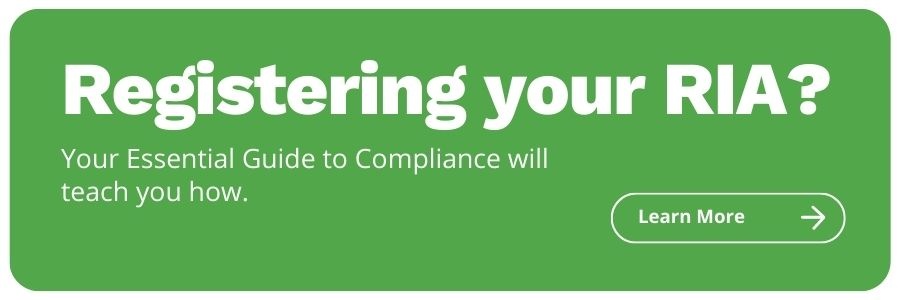Everything You Need to Know About Outside Business Activities (OBAs)
Share this
In the past decade, the focus within our industry on passive and multiple income streams has risen, especially among advisors in their first few years in business. Simply but, and OBA is a side hustle that RIA owners engage in alongside running their firm. But what does this mean from a compliance perspective? When considering what a firm or Chief Compliance Officer should contemplate and do in relation to OBAs, we’ve compiled a few key processes.
OBA Definition:
FINRA Rules 3270 (Outside Business Activities of Registered Persons) and 3280 (Private Securities Transactions of an Associated Person) require registered representatives to notify their firms in writing of proposed outside business activities (OBAs), and all associated persons to notify their firms in writing of proposed private securities transactions (PSTs), so firms can determine whether to limit or allow those activities. A firm approving a PST where the associated person has or may receive selling compensation must record and supervise the transaction as if it were executed on behalf of the firm. (FINRA)
OBA Policies and Procedures
For multi-person firms, you should review your Compliance Manual or Written Supervisory Procedural Manual (WSP) to ensure whether you have procedures addressing OBAs. At a minimum, the procedure should include: required reporting by all employees of any existing OBAs, review and approval of the OBA by the CCO, and an annual review of all employee’s OBA to confirm that there are no new activities, or if any were retired.
Solo Financail Advisor Considerations for OBA
Starting your own business is tough. It can be emotionally and financially draining, so it comes as no surprise that many advisors choose to supplement their incomes by dabbling in other temporary employment or side hustles. Many solo advisors engage in OBAs, including webinars, podcasts, or consulting. When thinking about disclosure and what is required to be communicated to clients you should consider whether this OBA is for compensation, whether this OBA is an advertisement of the firm’s business, and whether advisory clients will be solicited to make any purchases from your OBA. Depending on the circumstances and answers to these questions, disclosure may need to be made as an OBA of the firm or as an OBA of the individual. The scope of the disclosure (if necessary) depends on the role or title of the individual (for example, if you’re a proprietor or director), whether a conflict of interest exists, and whether your OBA will affect your advisory clients regarding services you perform.
Disclosure
OBAs must be disclosed in various regulatory documents. The main documents where an OBA may be required to be disclosed are Form U4, ADV Part 2A, and ADV Part 2B.
-
Form U4: Section 13, “Other Business,” requests disclosure of the following activity: any other business either as a proprietor, partner, officer, director, employee, trustee, agent, or otherwise (excluding non-investment-related activities that are exclusively charitable, civic, religious, or fraternal and is recognized as tax-exempt).
Common other business includes being on the Board of Directors for certain organizations, limited liability companies the representative owns for real estate rental properties, and other business ventures. If the employee does have an OBA that requires disclosure to their Form U4, certain information is required, such as the start date, address of the OBA, and an approximate number of hours spent each month, to name a few.
-
ADV Part 2A: Item 10, “Other Financial Industry Activities and Affiliations,” has a section dedicated to the firm or any of the firm’s management persons and whether they have affiliations either with a broker-dealer (registered representative), futures commission merchant, commodity pool operator, or a commodity trading advisor.
In addition, disclosure must be made for any management person who has a relationship with a related person (a person or business under common control), such as with an accounting firm, insurance company, or other investment advisor or financial planner. The disclosure must include whether the relationship creates a material conflict of interest and how the firm mitigates that conflict of interest. Note, at times, the "related person" can be yourself. For example, when you’re an investment advisor representative and an accountant at an accounting firm. In this case, disclosure should be made on whether these two entities are affiliated, have any referral arrangements, and if the representative receives compensation from the client through both entities.
-
ADV Part 2B: Item four must be completed if the representative is actively engaged in any investment-related business or occupation. The disclosure must include whether the OBA creates a material conflict of interest and how the firm mitigates that conflict of interest. In addition, disclosure must be made if the representative is engaged in any OBA for compensation that either provides a substantial source of income or requires a substantial amount of time (anything over 10% of the representative’s income or time).
Dual Registration
At times, some advisors choose to work at multiple RIAs either temporarily or on a part-time independent contractor basis. No matter the reason, depending on your state’s definition of “investment advisor representative,” you may need to get dually registered. If this is the case, some states do not allow for dual registration unless the two firms are affiliated. So before signing that employment or contractor agreement, make sure whether you are required to be registered, and if so, whether it’s allowed in your state.
We don’t need to make any assumptions about the first couple of years of firm ownership being a bit slow revenue-wise before business starts picking up—XYPN’s Annual Benchmarking Study results tell us just that. It’s understandable why some advisors choose to pursue OBAs while they are building and scaling. Others may engage in OBAs as they work part-time at another firm, offer consulting services, or maybe just have a hobby that qualifies as an OBA. Regardless of the circumstances, make sure you have all of your bases covered on the compliance front, and things should go as smoothly as possible.
Need assistance reviewing your documents and making sure you have all your compliance boxes checked off? If you are a member of XYPN, reach out to the compliance team if you need consulting support to update your documents or implement changes in your policies and procedures. Not a member? Download the Membership Guide to learn more about our robust compliance benefits along with everything else (hint: there’s a ton).
 About the Author
About the Author
Terria Heng has spent her career in financial regulatory compliance. She started out as a compliance consultant at a boutique compliance firm located in Beverly Hills, CA, where she assisted breakaway brokers in transitioning from wirehouses to the independent RIA space. Prior to joining XYPN, Terria was a financial examiner at the Texas State Securities Board for 6 years. Terria has extensive knowledge in state compliance examinations, including effectively communicating with regulators, responding to regulatory inquiries, and best practices in practice management. Currently living in Portland, Oregon, Terria enjoys hiking the Columbia Gorge with her dog Kuba or going on long road trips with her partner in their Sprinter van.
Share this
- Road to Launch with XYPN Member Alan Skillern, CFP®, MBA
- Coaching for Better Time Management: Prioritizing Organic Growth in Your Daily Routine
- Boost Your Financial Advisory Practice: SEO Strategies and CRM Optimization for Sales Success
- Navigating the AI Revolution: What Financial Advisors Need to Know
- Advisor Blog (692)
- Financial Advisors (221)
- Growing an RIA (99)
- Digital Marketing (87)
- Marketing (84)
- Community (81)
- Start an RIA (76)
- Coaching (72)
- Business Development (71)
- Running an RIA (70)
- Compliance (69)
- Client Acquisition (65)
- Technology (64)
- XYPN LIVE (59)
- Entrepreneurship (56)
- Sales (49)
- Practice Management (44)
- Client Engagement (41)
- XYPN Books (38)
- Bookkeeping (37)
- Investment Management (37)
- Fee-only advisor (36)
- Lifestyle, Family, & Personal Finance (31)
- Employee Engagement (30)
- Client Services (25)
- Financial Education & Resources (24)
- Journey Makers (21)
- Market Trends (21)
- Process (14)
- Niche (11)
- SEO (9)
- Scaling an RIA (9)
- Career Change (8)
- Transitioning Your Business (7)
- Partnership (6)
- Transitioning To Fee-Only (4)
- Social Media (3)
- Transitioning Clients (3)
- Emerald (2)
- Persona (2)
- RIA (2)
- Onboarding (1)
- Sapphire (1)
Subscribe by email
You May Also Like
These Related Stories

Avoiding Common Regulatory Filing Deficiencies for Your RIA
Sep 23, 2019
18 min read

Identifying and Disclosing Conflicts of Interest: A How-To for Financial Advisors
May 9, 2019
6 min read





